When it comes to travel, I am a born skeptic.
Everything that can go wrong probably will. The places we visit won’t be that great. The tour guides won’t tell me anything I couldn’t have learned from reading. The people on the trip may not be a good mix of personalities — or worse, they may all be annoying. The food will likely disappoint. The days will be too long. Or, too short. The shows can’t be as good as the ones we have in Staunton. What is the point, really?
I know this cynical view doesn’t sound like a good starting point for the person organizing a trip for 22 participants. To England. For 10 days.
But, I think that, instead of proving the wrong attitude, my take may have made the trip even more enjoyable than it would have been if I had started in a more “Pollyanna-ish” state. Maybe it has to do with my personal adage: If you expect to be disappointed, you may end up being pleasantly surprised — only, in the case of the 2016 ASC Land of Lords trip, “pleasant” would be a huge understatement. I was joyfully, tremendously, thoroughly, and completely delighted by virtually every moment, certainly every person, and absolutely the experience of the trip as a whole.
Myth #1: Everything that can go wrong probably will.
Director of Mission and ASC co-founder Ralph Cohen, Academic Resources Manager Cass Morris (or, as we call her, the person in charge of words for Education), and I worked for over a year to put together this adventure we called Shakespeare’s England: A Land of Lords. The fact that our fearless (Shakes-Fear-less, to be precise) leader was working on his book, giving a couple of talks a month in various locations across the US, and travelling to Italy for about four weeks immediately before our trip began might have spelled doom for many.
Added to Ralph’s lack of available time in which to provide guidance, Cass and I, of course, hosted our biennial conference for 300 in October 2015, as well as adding a few other conferences and events to our schedule for the Legacy year (400th Anniversary of Shakespeare’s death). Because that wasn’t quite enough, we also kept ourselves downright busy with other things like hiring new college prep staff and preparing to move our offices while we were in the UK. All of which should have added up to a trip that didn’t make — or at least, a trip that didn’t make with sufficient numbers for all of our team to attend, but instead, we found just the right number (and right mix) of intrepid souls to join us.
Moreover, excellent communication from Cass leading up to the trip (see her blogs here) built enthusiasm and provided essential facts to help us prepare for the group’s time together in England. With a couple of focused days (pinning down dates and addresses for our coach driver, calling and emailing all of the locations we would visit) and some true turns of luck — Why did flights suddenly drop 5 weeks out from departure? Anyone hear of Brexit (an unexpected boon to our budget)? — and the kindness of the group sales folks in the UK, we nailed every venue and tour guide down, we figured out every visit to the minute, and we began to look forward to a trip that would fill the non-skeptic with delight.
 It’s true, when travelling, the airport is the most likely place something can go wrong, so it proved to be no surprise when, yes, some flights were delayed. By some turn of fate, we still landed 19 of our 22 travelers with little to no delay (though stellar camper Rick M. unexpectedly added an extra leg to his journey in order to make it on time — two legs, if you count the walk between Terminals three and two). Everyone got through passport control, we made it to our coach (and the amazing driver, Mike, who would guide us down all of the tiny roads one could find in Shakespeare Country) in good time after a lovely catch up and meet and greet in Terminal 2’s Caffe Nero at Heathrow. What about the other three, you might ask? As Fortune would have it, they were on the same flight and landed the very next day, whereat, we were able to arrange for a car to chauffeur them directly to our lovely lodging in Broadway.
It’s true, when travelling, the airport is the most likely place something can go wrong, so it proved to be no surprise when, yes, some flights were delayed. By some turn of fate, we still landed 19 of our 22 travelers with little to no delay (though stellar camper Rick M. unexpectedly added an extra leg to his journey in order to make it on time — two legs, if you count the walk between Terminals three and two). Everyone got through passport control, we made it to our coach (and the amazing driver, Mike, who would guide us down all of the tiny roads one could find in Shakespeare Country) in good time after a lovely catch up and meet and greet in Terminal 2’s Caffe Nero at Heathrow. What about the other three, you might ask? As Fortune would have it, they were on the same flight and landed the very next day, whereat, we were able to arrange for a car to chauffeur them directly to our lovely lodging in Broadway.
Myth #2: The places won’t be that great.
I just finished the final touches on our expenses, and that meant recalling every place we visited though the receipts they generated. In 10 days, we visited 15 houses or castles, 10 gorgeous churches, 5 exceptional gardens, took 5 fantastic walks, ate en masse at 5 terrific places, saw two shows at the Royal Shakespeare Company (with some of our campers adding to that number in Cambridge), and saw not only Shakespeare’s birthplace and school but also, we were among the first 300 people in the world ever to see Will’s will in person–that three page document so closely associated with our reason for being in the UK. And, in addition to our own two fantastic faculty members (who gave lectures on almost every place we visited), we heard from four amazing guides, I’m exhausted just thinking about it.
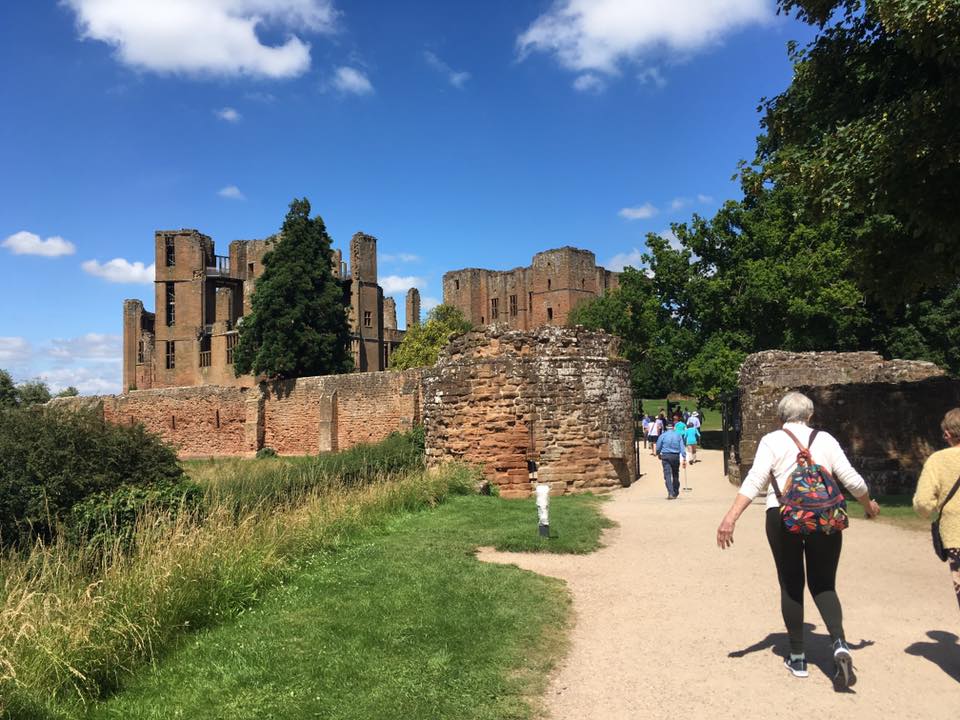 But more than sheer quantity, we saw quality places. My eyes were opened to powerful art at Burghley House, while Hardwick Hall’s architecture blew me away (not to mention a lovely exhibit on Arbella, the Stuart who might have been Queen, had Elizabeth acknowledged her lineage above James’s). Chatsworth’s and Powis’s gardens stunned, and Alwnick connected Downton Abbey, Harry Potter, and Hotspur in ways I had not imagined (but very much enjoyed). The ruins of Ludlow, Kenilworth, and Dunstanburgh presented space for quiet contemplation and re-imagining scenes, while walks to Heddon-on-the wall and Broadway Tower allowed me to get to know our participants better. When one travels with a certain Director of Mission, one should expect to see some churches. But, oh, the churches we saw. From the tiny churches like those Heddon-on-the-Wall, and Stanton (pronounced Stanton, believe it or not!), which revealed their periods of growth in architectural details outside and in, to the fantastic cathedrals in York and Norwich, we saw an array of churches which represented the changing faith of Shakespeare’s home land from his earliest History plays through to the period of his last.
But more than sheer quantity, we saw quality places. My eyes were opened to powerful art at Burghley House, while Hardwick Hall’s architecture blew me away (not to mention a lovely exhibit on Arbella, the Stuart who might have been Queen, had Elizabeth acknowledged her lineage above James’s). Chatsworth’s and Powis’s gardens stunned, and Alwnick connected Downton Abbey, Harry Potter, and Hotspur in ways I had not imagined (but very much enjoyed). The ruins of Ludlow, Kenilworth, and Dunstanburgh presented space for quiet contemplation and re-imagining scenes, while walks to Heddon-on-the wall and Broadway Tower allowed me to get to know our participants better. When one travels with a certain Director of Mission, one should expect to see some churches. But, oh, the churches we saw. From the tiny churches like those Heddon-on-the-Wall, and Stanton (pronounced Stanton, believe it or not!), which revealed their periods of growth in architectural details outside and in, to the fantastic cathedrals in York and Norwich, we saw an array of churches which represented the changing faith of Shakespeare’s home land from his earliest History plays through to the period of his last.
Our day in the near-“Disney” Stratford-Upon-Avon was made perfect by a wonderful connection at Shakespeare Birthplace Trust, Cait Fannin-Peel. Cait took our program in hand, arranged for a fascinating talk to introduce the ongoing work of the Trust (and won a few donors to the New Place project), she got us into three open properties and gave us a sneak peek of New Place — a site that was two weeks from opening. She didn’t personally arrange for the National Archive to display Shakespeare’s will just on the day we were touring, but I think she could probably arrange — and would — something of that magnitude. She walked us to Anne Hathaway’s cottage, took us to Hall’s Croft, shared her stories of Holy Trinity (and tried her best to get us into it when a wedding prevented it — then DID get us into it on Monday morning, first thing), made sure we saw the Guildhall and Shakespeare’s school, and basically gave us her Saturday. We encountered so many people of like generosity, at Chatsworth, at Norwich Castle, and in our lovely hotels, it felt as though England had rolled out the red carpet for us.
Myth #3: The tour guides won’t tell me anything I couldn’t have learned from reading.
First of all, I knew better than to think this about either of our faculty members. But having had them both in class, I was pretty sure I wouldn’t be hearing anything — or not much — new. Boy, was I wrong. If you have the chance to take Mary Hill Cole or Ralph Cohen on a jaunt around England, let me just say, I recommend it. Mary Hill contextualized every location and made the coach trip fly by as we travelled from place to place. Ralph has a knack for pointing out the visual clues to history and makes the being there matter. He also falls into lovely coincidences, like the statue of the Saints Crispin in a Shrewsbury garden that wasn’t even on our itinerary–our leadership seminar uses Henry V’s Agincourt speech in every session we host, so I’ve heard that speech a dozen times in the last year at least–making concrete the words with which I work, and who knew they were the saints of Shoemakers?!
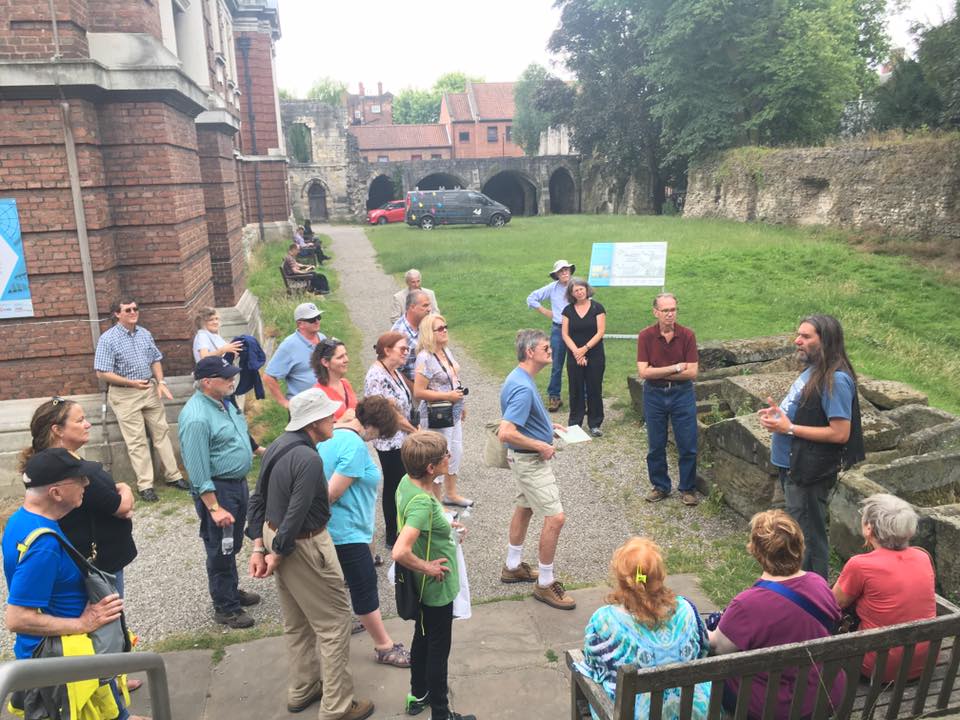 Then, there were the tour guides. We found four people who not only really knew their stuff, but also, passionately, wanted to share it, in dynamic and delightful ways. Alan, of White Rose Tours in York (chosen purely because Cass and Lia Razak, our College Prep Programs Manager, are such Yorkists) [Editor’s Note: #whiteroserightrose], led us on a humorous 90-minute excursion with perfectly timed stopping points and, yes, jokes. As it turned out, he is a stand-up comedian, so we were laughing about Richard III and the York wall, while also learning fascinating things about their history. Our Cambridge guides, Chris and Tony of Cambridge Tour Guides, had a gift for engaging the group, and as Alan had in York, for connecting Shakespeare to the surroundings. In Cambridge, as it seemed every tourist in the UK decided to visit the day we did, they expertly shuttled us around rambunctious teens from at least a dozen different countries and advised us on where to go and what to do post tour, too. They had a talent for getting us into sites just before a christening or between banquets so we felt like we had found guides with a magic touch — or superior timing, or both. Our staff guide at Alnwick seemed almost as delighted to talk about its use as a location in films from Harry Potter to Elizabeth and shows from Downton Abbey to The Hollow Crown: The War of the Roses. As with all of our exceptional guides, his enthusiasm carried us right past the time set, and we almost all got to stay in Alnwick for the night; the gate began closing around us as we dashed back to the coach and on towards Dunstanburgh.
Then, there were the tour guides. We found four people who not only really knew their stuff, but also, passionately, wanted to share it, in dynamic and delightful ways. Alan, of White Rose Tours in York (chosen purely because Cass and Lia Razak, our College Prep Programs Manager, are such Yorkists) [Editor’s Note: #whiteroserightrose], led us on a humorous 90-minute excursion with perfectly timed stopping points and, yes, jokes. As it turned out, he is a stand-up comedian, so we were laughing about Richard III and the York wall, while also learning fascinating things about their history. Our Cambridge guides, Chris and Tony of Cambridge Tour Guides, had a gift for engaging the group, and as Alan had in York, for connecting Shakespeare to the surroundings. In Cambridge, as it seemed every tourist in the UK decided to visit the day we did, they expertly shuttled us around rambunctious teens from at least a dozen different countries and advised us on where to go and what to do post tour, too. They had a talent for getting us into sites just before a christening or between banquets so we felt like we had found guides with a magic touch — or superior timing, or both. Our staff guide at Alnwick seemed almost as delighted to talk about its use as a location in films from Harry Potter to Elizabeth and shows from Downton Abbey to The Hollow Crown: The War of the Roses. As with all of our exceptional guides, his enthusiasm carried us right past the time set, and we almost all got to stay in Alnwick for the night; the gate began closing around us as we dashed back to the coach and on towards Dunstanburgh.
Myth #4: The people on the trip may not be a good mix of personalities–or worse, they may all be annoying.
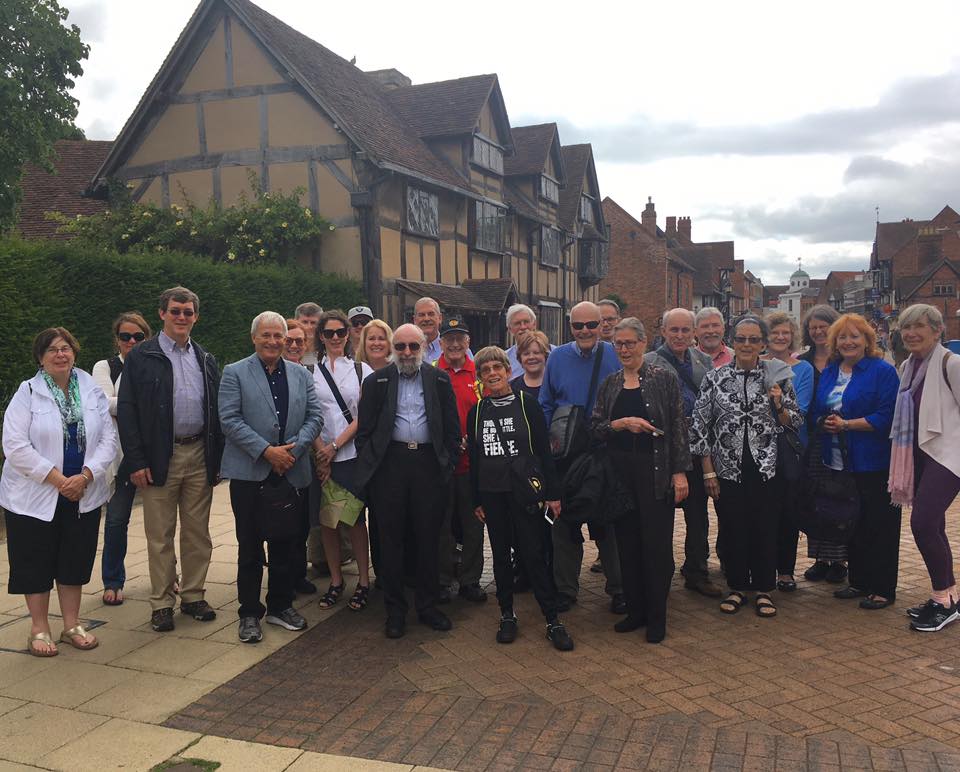 In addition to places and guides, experiences, like breakfast every morning with a different friend to communal meals and banquets and teas, and even a rained out picnic, offered us all the chance to meet new people and deeply engage with their history and relationship to Shakespeare. We mixed up our seating on the coach, took opportunities for extra excursions (there wasn’t quite enough on the schedule already!), and made special dates for dinner and lunch just to visit with new group members. At one of our first stops, I picked up a card set for one of the people I’d heard talking about wanting to know the Kings and Queens better, and thus began a tradition carried out by Cass, Ralph, and me. At each gift shop, we would find something for each of our group — special to them. So Sandy, who looked for Green Men in each church, received a book on them at our final banquet. The ever-patient and sweet Ruth, always waiting for her photog husband Warren, found a folding fan to help her wait out his documentary excursions. Notebooks and poetry collections for our writers and teachers, our gorgeous Gay found a blue glass just the hue of her favorite necklace in wait, our “student” Donna will make use of her new book as she finishes earning credit for the trip, and Ed and Lois each got items to further their enthusiasm for learning more about the UK’s royalty. This project was as rewarding for me as for the gift recipients, as I delighted in thinking about them — what made each so special, George’s enthusiasm and kindness, Jim’s quiet intellect, Betty’s “just do it” attitude — and why each was such a special and perfect addition to our group.
In addition to places and guides, experiences, like breakfast every morning with a different friend to communal meals and banquets and teas, and even a rained out picnic, offered us all the chance to meet new people and deeply engage with their history and relationship to Shakespeare. We mixed up our seating on the coach, took opportunities for extra excursions (there wasn’t quite enough on the schedule already!), and made special dates for dinner and lunch just to visit with new group members. At one of our first stops, I picked up a card set for one of the people I’d heard talking about wanting to know the Kings and Queens better, and thus began a tradition carried out by Cass, Ralph, and me. At each gift shop, we would find something for each of our group — special to them. So Sandy, who looked for Green Men in each church, received a book on them at our final banquet. The ever-patient and sweet Ruth, always waiting for her photog husband Warren, found a folding fan to help her wait out his documentary excursions. Notebooks and poetry collections for our writers and teachers, our gorgeous Gay found a blue glass just the hue of her favorite necklace in wait, our “student” Donna will make use of her new book as she finishes earning credit for the trip, and Ed and Lois each got items to further their enthusiasm for learning more about the UK’s royalty. This project was as rewarding for me as for the gift recipients, as I delighted in thinking about them — what made each so special, George’s enthusiasm and kindness, Jim’s quiet intellect, Betty’s “just do it” attitude — and why each was such a special and perfect addition to our group.
Myth #5: The food will likely disappoint.
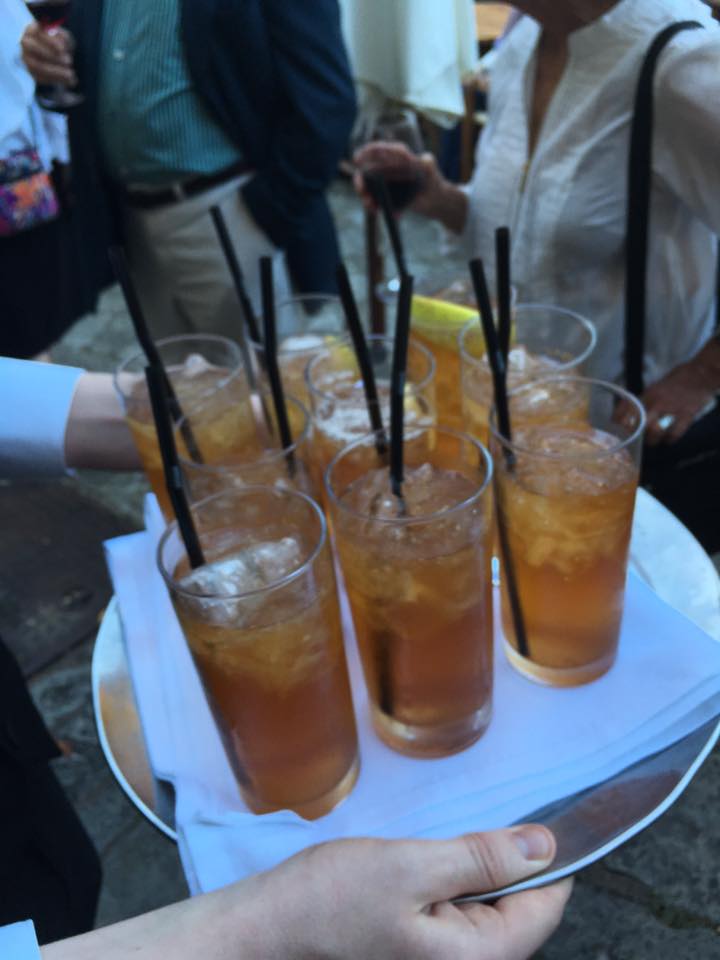 Well, that was just wrong. From our first lunch at The Mermaid in the charming Burford, to our speciality cocktail “Much Ado About Nothing” at Lygon Arms, to the unbelievable seafood at Craster–with a view of the ocean that only made it more sweet, to the meals out with friends–Indian (with an amazing Family size Naan) with Philip, Rick, Betty and Cass, and Scottish with John–to our Traditional Tea at the Swan in Lavenham, and finally, our last evening at the beautiful Felix Hotel, we ate our way through England quite, quite well.
Well, that was just wrong. From our first lunch at The Mermaid in the charming Burford, to our speciality cocktail “Much Ado About Nothing” at Lygon Arms, to the unbelievable seafood at Craster–with a view of the ocean that only made it more sweet, to the meals out with friends–Indian (with an amazing Family size Naan) with Philip, Rick, Betty and Cass, and Scottish with John–to our Traditional Tea at the Swan in Lavenham, and finally, our last evening at the beautiful Felix Hotel, we ate our way through England quite, quite well.
Myth #6: The days will be too long. Or, too short.
When traveling, one must ask oneself if one wants to sit in a room (which would have been a great option at any of our hotels!) or see the places they came to visit. Our guests felt free to choose, with almost everyone skipping at least one excursion to do something on their own. Even those who didn’t, I would warrant a guess, enjoyed the easy balance of one day at each hotel stop which kept us close and allowed for some breathing space. We had among us, even, some adventurous types who visited a dance club in York — they shall remain nameless; I was only there to make sure everyone was safe, I assure you.
Myth #7: The shows can’t be as good as the ones we have in Staunton.
Well… Yes, this part was true. But, what a wonderful chance to see some shows and draw comparisons. The different spaces and the choices made by the productions we saw generated fascinating conversations, and we each benefited from seeing the work.
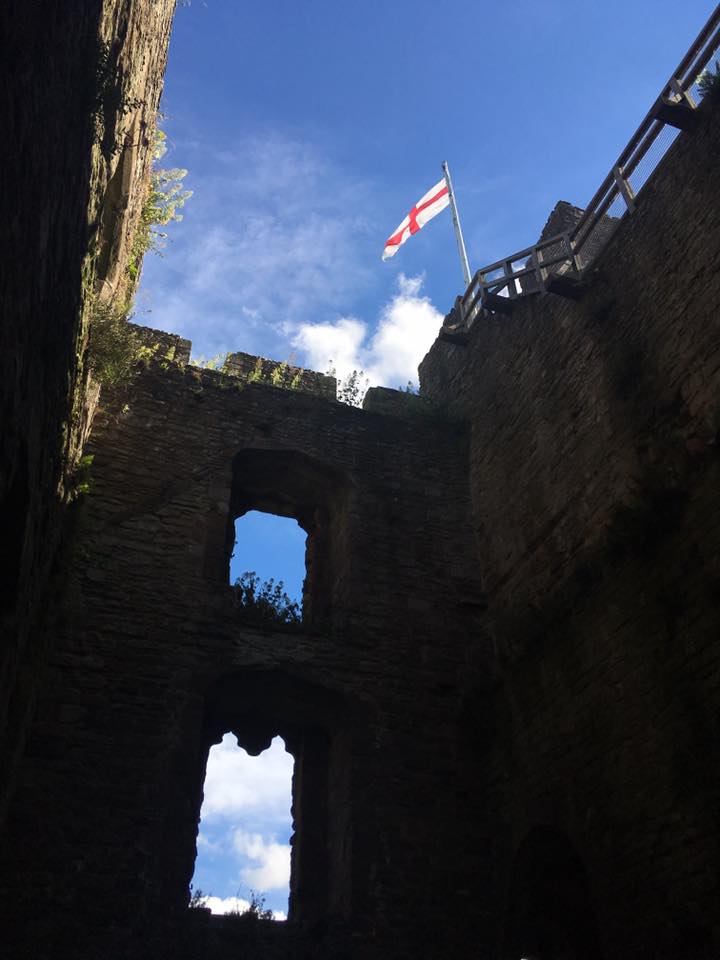 Myth #8: What is the point, really?
Myth #8: What is the point, really?
The point is, when we leave our comfort zone, especially with others, we learn about life in new ways. History feeds the present, perhaps most in Shakespeare Studies, but in many other ways as well. Perhaps more importantly, and my biggest takeaway on this trip, is that present feeds the present, too. Present people, present places, present presents, expand minds, hearts, and give way to the sincere hope that we will see one another again. And soon.
The No Kidding Shakespeare Camp convenes annually in Staunton to provide enrichment to fans of Shakespeare and of life, especially those who seek a unique way to fill the hours of their summer. We built 2016’s Land of Lords trip to celebrate Shakespeare’s legacy in the 400th year since his death. The 2017 topic for our return to Staunton will be Shakespeare and Art. We hope to see you there.
–Sarah Enloe, Director of Education


